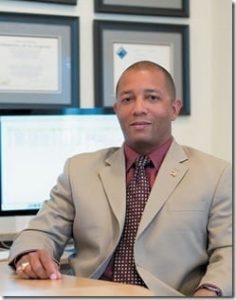Minority-owned firm heads up demolition of the old Wando River Bridge
August 30, 2017When Kenneth Canty worked on the 2005 Cooper River Bridge demolition project in Charleston, SC, he was one of many engineers working together to safely bring down the aging structure. Twelve years later, his firm, Freeland Construction, Inc., headed up the demolition of the Wando Bridge in nearby Mt. Pleasant, likely becoming the first African-American firm to manage a project of that scope.
On August 18, amidst a smattering of dockside and waterborne onlookers, Canty, a Professional Engineer, stood aboard a 500-ton crane barge observing the process to ensure everything went according to his plans. He looked on as a 16-story crane lifted the old S.C. Highway 41 swing bridge and loaded it onto a smaller barge in preparation for towing to its new life as an artificial reef.
The five-month process began with a structural analysis to determine what would be required to successfully remove the truss bridge from the concrete approach slabs. “Believe it or not,” Canty says, “removing the truss as a single unit is actually the safest way to do it, rather than cutting it up into smaller sections.”
Then, Canty had to locate a crane and riggings sturdy enough to lift the truss, and a barge stable enough to float the steel structure out to sea.
While he may have made history with the successful demolition, safety was Canty’s primary concern. “As engineers and contractors, we always think safety first; we want to make sure that everything is environmentally sound,” Canty says. “But as the first minority firm, there is a lot of attention that goes into that so we had to be triply careful of everything we did.”
Once the truss was removed from the concrete slabs and placed on the barge, it became the property of SC Governor’s Cup and the SC Department of Natural Resources. The truss will join the two other large barges that were placed on the bottom of the ocean within the Charleston Deep Reef Marine Protected Area 50 miles offshore in 2014. The addition of material from the Highway 41 bridge is expected to further enhance the available habitat and become home to numerous species of fish and aquatic life.
For Canty, the next step is to remove all the approach slabs, spans and pilings. He will also oversee the drilling and blasting of the center pier. The concrete will then be deposited at other SCDNR artificial reefs closer to shore which are open to recreational bottom fishing. “The concrete material creates good reef structure, particularly in shallower waters,” Canty adds.
Canty credits prime contractor, PCL Construction, his partners and subcontractors for the successful outcome. PCL was responsible for the construction of the new Wando River Bridge and subcontracted the demolition, removal and disposal of the old swing bridge to Freeland. Stevens Towing Company provided the fleet of barges, tugs, and cranes. Chao and Associates, another SC minority-owned firm, provided additional structural analysis.
Canty doesn’t discount the support he received from the SC Department of Transportation, SC Department of Natural Resources, and the MBDA Business Center – Columbia, SC. “All these parties worked together to make this happen. It took a lot of agencies and committed people to manage all these moving parts.”
Greg Davis, director of SCDOT’s Division of Minority & Small Business Affairs, says, “SCDOT is committed to diversity and leveling the playing field for minority contractors. We are excited to work with prime contractors like PCL that match our commitment to diversity. Ken Canty being given the opportunity to manage the Wando Bridge demolition is a perfect example of what our DBE Program was put in place to do. Having said that, this project was a success on many fronts.”
Kelli Kelly, director of Diversity and Inclusion for PCL Construction says, “PCL is proud to partner with firms like Freeland Construction to provide the residents of South Carolina with a safe and environmentally-sound solution to the removal of the aging Wando River Bridge. This partnership proved to be a meaningful opportunity for PCL to deepen our commitment to collaborating with small and diverse businesses while providing sustainable solutions to complex challenges.”
Camille Shaw, director of MBDA Business Center – Columbia, SC, says, “Minority businesses are not often given the opportunity to demonstrate their expertise, particularly on challenging and high profile projects. I’m proud that Mr. Canty was able to demonstrate his abilities, which lead to this history-making feat. With his every success, he lays the foundation for other firms to build upon.”
Canty’s next project is the Route 701 Bridge in Georgetown. Although the bridge is more inland and the project a little different, he is looking forward to similar success.
ADDITIONAL INFORMATION: Video – Hear Canty explain the demolition process in his own words.
About the MBDA Business Center
The mission of the MBDA Business Center – Columbia, SC is to assist Minority Business Enterprises compete in the global economy and to stimulate the national and local economy through job creation. To fulfill this mission, we assist MBEs with access to contracts and capital, strategic business counseling, and becoming export-ready. For more information on the MBDA Business Center and its services, visit ColumbiaMBDACenter.com or call (803) 743-1152.














